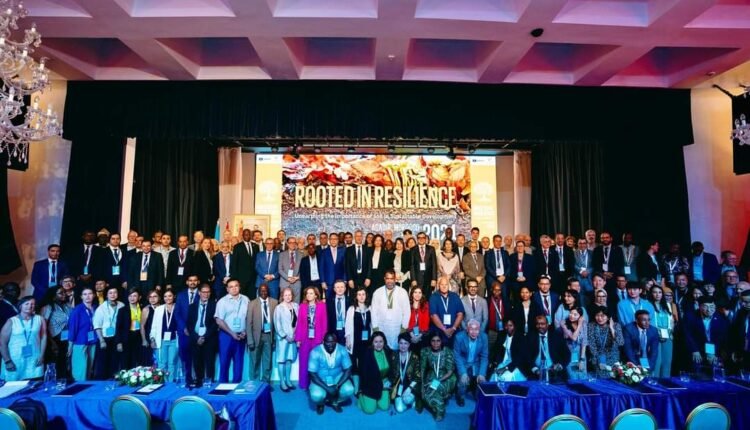From the Kingdom of Morocco, UNESCO Issues a Global Warning on the Rapid Degradation of Soil
#Adil EL ARABI.
In an international symposium organized, on 1 July 2024 in Agadir, by the United Nations Educational, Scientific and Cultural Organization (UNESCO) in collaboration with the National Agency for the Development of Oases and Argan Trees (ANDZOA) in Agadir, environmental and biodiversity experts called for urgent actions to preserve global soil. The experts at the conclusion of the symposium recommended identifying and assessing changes in soil health due to biotic and abiotic activities and the impact of these changes on humans and the environment, especially in light of current climate changes.
The symposium was organised in the opening of the 36th session of the International Coordinating Council of the Man and the Biosphere Programme, where experts emphasized the importance of prioritizing intervention areas to improve soil rehabilitation and ensure sustainable development, focusing on water, biodiversity, food security and landscape management.

During the closing session of this event, Mr. Seddiki, Minister of Agriculture, highlighted that this event reinforces Morocco’s commitment to preserving natural resources, promoting sustainable development, and improving the relationship between humans and the natural environment.
In his closing remarks, attended notably by UNESCO Director-General Audrey Azoulay and a group of international experts and researchers in this field, he stated, “Choosing Morocco to host this event reflects the international community’s recognition of the Kingdom’s active role in biosphere matters under the enlightened leadership of His Majesty the King.”
The government official emphasized that Morocco currently hosts four UNESCO-recognized biosphere reserves, including the Argan Biosphere Reserve, the Oases Biosphere Reserve in southern Morocco, the Intercontinental Biosphere Reserve of the Mediterranean, and the Cedar Biosphere Reserve in the Atlas.
He explained that “Since joining the MAB program, Morocco has been fully committed to protecting its ecosystems, which are living laboratories for developing innovative practices for natural resource management, climate change adaptation, and environmental education promotion,” adding that sustainable resource management has become a lever for comprehensive development in the face of climate challenges.
He further stated, “We have implemented sustainable agricultural policies aimed at improving the entire agricultural value chain, while ensuring the preservation of natural resources and enhancing agricultural resilience in rural areas and communities facing climate challenges,” emphasizing the “Green Generation 2020-2030” and “Forests of Morocco 2020-2030” strategies.
Minister of Agriculture also stressed that Morocco has made significant progress in water resource management and reforestation.
Mr. Seddiki said, “We have launched ambitious initiatives to restore degraded ecosystems through reforestation and watershed management programs, thereby helping combat soil erosion and desertification.”

UNESCO Director-General Audrey Azoulay stated, “Soil plays a crucial role in sustaining life on Earth. However, it is often neglected or mismanaged.”
In this regard, she called on the 194 member states of the organization to step up soil protection and rehabilitation efforts, noting that UNESCO is also undertaking actions to address the lack of scientific knowledge in this field.
Ms. Latifa Yaacoubi, recently elected as the new Chair of the International Coordinating Council of UNESCO’s Man and the Biosphere Programme, succeeding Nigerian Adedapo Adeshola, expressed her gratitude for the trust placed in Morocco to chair the Council, affirming her commitment to working with other members and partners to accomplish various projects under the program.

She stated, “I am honored to take on this responsibility, and I am fully committed, following the royal directives, to strengthening cooperation with member states and continuing efforts to promote the development of biosphere areas, in line with the Sustainable Development Goals.”

Dr. Rachid Moussadek , a Senior Scientist at ICARDA and INRA, explained in his keynote speech about “Soil Health to Face the Climate Change – Challenges and Opportunities,” that solutions are available to enhance soil health, emphasizing the need to increase the soil organic matter content, preserve groundwater, and improve biodiversity. He highlighted the importance of promoting environmentally friendly agricultural practices, particularly among the youth, outlining, as example, an ambitious program aimed at promoting conservation agriculture over an area of one million hectares, in addition to projects dedicated to oasis areas to address climate change in Morocco.
He also addressed Morocco’s initiatives in this field for the benefit of the African continent, such as the Adaptation of African Agriculture (AAA) initiative to climate change, and the Soil Fertility Map created by the Ministry of Agriculture, Fisheries, Rural Development, Water and Forests in collaboration with the OCP Group and the National Institute of Agricultural Research (INRA), which has been shared with around twenty African countries as part of South-South cooperation supported by His Majesty King Mohammed VI.

Dr. Liette Vasseur, Chair of the UNESCO Chair on Community Resilience at Brock University in Canada, emphasized that soil protection requires awareness, education, and the promotion of scientific research, highlighting the importance of involving local communities and increasing their awareness of the importance of soil management. She added that the challenges in Africa are significant, given the low rainfall and its impact on soil health and vegetation cover.
Professor Helena Freitas, Professor of Biodiversity and Environment at the University of Coimbra in Portugal, stressed the importance of maintaining soil health and preventing its degradation to protect ecosystems. She called for a “strong initiative” to preserve and restore soil, asserting that the world needs soil to sustain productive and living ecosystems and to prevent water loss, especially in countries facing drought.
Ms. Natalia Rodriguez Eugenio, Soil and Water Officer at the Food and Agriculture Organization of the United Nations (FAO), stated that there are various ways to protect soil, including raising community awareness from children to farmers and policymakers about the importance of soil.


